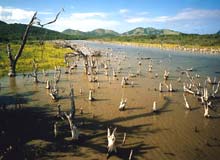
Two of the nation’s premier atmospheric scientists, after reviewing extensive research by their colleagues, say there is no longer any doubt that human activities are having measurable-and increasing-impacts on global climate. Their study cites atmospheric observations and multiple computer models to paint a detailed picture of climate changes likely to buffet Earth in coming decades, including rising temperatures and an increase in extreme weather events, such as flooding and drought. The study

A $5 million University of Colorado at Boulder satellite dubbed the “Little Satellite That Did” now is expected to re-enter the atmosphere and burn up in early December following a successful six-year mission.
The Student Nitric Oxide Explorer, or SNOE, is carrying instruments that have measured nitric oxide in the upper atmosphere that affects Earth’s ozone layer, the intensity of X-rays from the sun and ultraviolet light from Earth’s aurora. Developed at CU-Boulder’s Laboratory for Atmosp
Italy Hosts Second Meeting Of Group On Earth Observation
The ad-hoc intergovernmental Group on Earth Observations (GEO) will hold its second meeting this week in Baveno, Italy. The meeting aims to give direction to the continued development of a 10-year plan to implement a comprehensive, coordinated, and sustained Earth observation system or set of systems. The first meeting took place in August 2003 in Washington, DC, immediately after the first Earth Observation Summit, which estab
As the first snowfalls mark the opening of the new skiing season in Europe, glaciologists at the University of Wales, Aberystwyth (UWA) are warning that time may be running out for ski resorts built on glaciers.
Dr Bryn Hubbard of the Centre for Glaciology at UWA is studying the response of some of the world’s most sensitive ice masses to climate change. As part of the work his team is set to study the decay of the Tsanfleuron glacier in Switzerland, home to one of the country’s premier summ
A group of scientists from the New York-based Wildlife Conservation Society (WCS), working with the Marine and Coastal Management Branch of South Africa, have perfected an unusual, hands-on method to study great white sharks, where these fearsome predators are gently hauled into research vessels to receive high-tech satellite tags.
According to the scientists, the technique is safe to both shark and researcher, resulting in better data to understand – and ultimately protect – one of nature&#

Dotted across varied regions of our planet are the waterlogged landscapes known as wetlands. Often inaccessible, these muddy areas are actually treasure houses of ecological diversity – their overall value measured in trillions of Euros.
For much of the last century wetlands have been drained or otherwise degraded, but scientific understanding of their important roles in terms of biology and the water cycle has grown, spurring international efforts to preserve them. On 20 November ESA forma